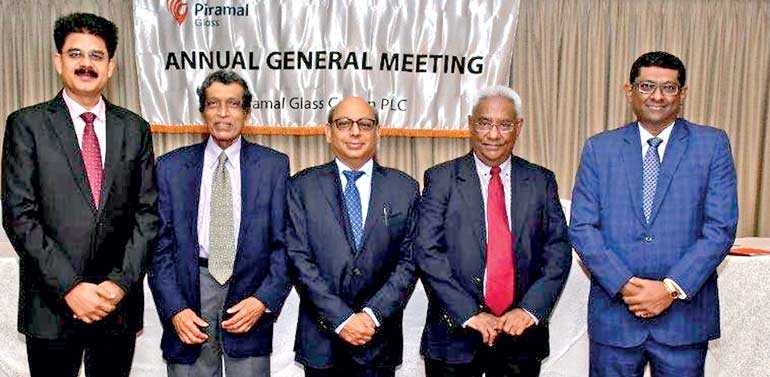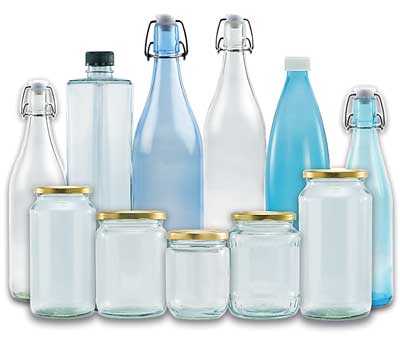Sunday Feb 22, 2026
Sunday Feb 22, 2026
Tuesday, 14 August 2018 00:00 - - {{hitsCtrl.values.hits}}
 Piramal Glass CEO Sanjay Tiwari (left) with the Board of Directors
Piramal Glass CEO Sanjay Tiwari (left) with the Board of Directors
Piramal Glass Ceylon PLC has announced its results for 1Q FY 2018-19 with Rs. 1,649 million in revenue and Rs. 86 million in profit before tax.
The revenue during the first three months of FY2018-19 was Rs. 1,649 million, which reflects a growth of 17.5% when compared to the similar period of previous year revenue of Rs. 1,403 m.
Domestic market
Domestic sales stood at Rs. 1,016 million as against Rs. 1,084 million in the same quarter of the previous year, reflecting a de-growth of 8%. This decline has continued in the domestic market for the second consecutive year. The major impact came through the liquor segment. Over the past two years a shift of consumption was observed from the high-end locally-filled foreign liquor segment to the low-end liquor. This was further aggravated with the heavy taxes imposed on the liquor industry. 
The high-end liquor segment of the industry uses new bottles whilst the low end uses used scrapped bottles. Thus this shift has impacted the demand of fresh bottles.
The company has entered into the retail segment with the launch of glass bottles within the category of food and water.
Several innovative designs and options are now available for household consumption. Currently the products are available at the factory outlet of the company at Ratmalana; Arpico Supercenters (20+ outlets islandwide); The Outlet Store – Bambalapitiya; St. Anthony’s Home mart – Nawala; Titus Stores – Pettah; DN Enterprises – Maharagama; Zden – Colombo 4; Assena Marikar & Co. – Colombo 11; E-commerce sites Mydeal.lk, Wow.lk and Takas.lk.
This has opened an avenue for a new category of business. This venture is to support the worldwide green initiative of protecting the environment & for the wellbeing of our future generation by providing alternative to plastics & PET.
Exports
The Export sales for the quarter grew by 98% to Rs. 633 million as against the Rs. 319 million in the similar quarter. This is 39% of the overall sales value as against 23% in the previous year First Quarter. The company did its best to fill the excess capacity created with the decline in the domestic market though exports.
Most of the orders obtained at short notice from the mass market as capacity fillers did not yield the same attractive margins as the domestic and high niche segment of the exports. The company continuously strives towards gradually shifting the volumes from the mass market to the premium segment.
Presently the company is exporting to USA, Canada, New Zealand, Australia, India, Pakistan, Myanmar and several other markets. A significant growth has been experienced in the USA and Canadian markets.
Cost escalation
Gross profit for the period under review is Rs. 286 m as against Rs. 351 m in the corresponding period previous year, with product mix being one of the reasons for low margins; the other factors were the energy costs and other input cost increases.
The LPG rate was an all-time high for the past three years. The diesel rate increase by Rs. 24 per litre impacted the cost of production on several fronts including increases in raw material prices, packing material cost and transportation costs.
Investment and expansion
The final phase of the capacity expansion project is likely to be completed with the installation of the sixth production line by the end of the current financial year. The total additional investment for this project will be Rs. 1 b. This investment will facilitate the company to utilise its installed capacity to maximum.
With the successful installation of the 3MW rooftop solar power plant which is the largest single location installation in the country, the company is further exploring various alternatives to bring down the energy cost which is the major cost component in glass manufacture. In this regard the company is seeking support and approvals from the relevant regulatory authorities.
During the period under review the company upgraded its existing ERP system by implementing SAP HANA 4. The management hopes to have more efficient work environment and timely information for decision making.
Piramal Glass Ceylon (formerly Ceylon Glass Company) is the only glass bottle manufacturing plant in Sri Lanka. It had the opportunity of coming under the umbrella of the Piramal Group in 1999. Presently located in Horana, it has been in existence for over 60 years.
The company originally at Ratmalana was relocated at Horana in 2007 as a BOI venture. PGC at its manufacturing facility has the capability to offer glass containers in different shapes and colours for multiple industries such as food, liquor, pharmaceutical, agro chemical and soft drinks. The Piramal Group led by Ajay G. Piramal is one of India’s foremost business conglomerates. Driven by the core values of knowledge, action, care and impact, the Piramal Group has a formidable presence in healthcare, drug discovery and research, glass, real estate and financial services. The Piramal Group also pursues sustained community activities in healthcare, education, emergency medical services, and heritage restoration.